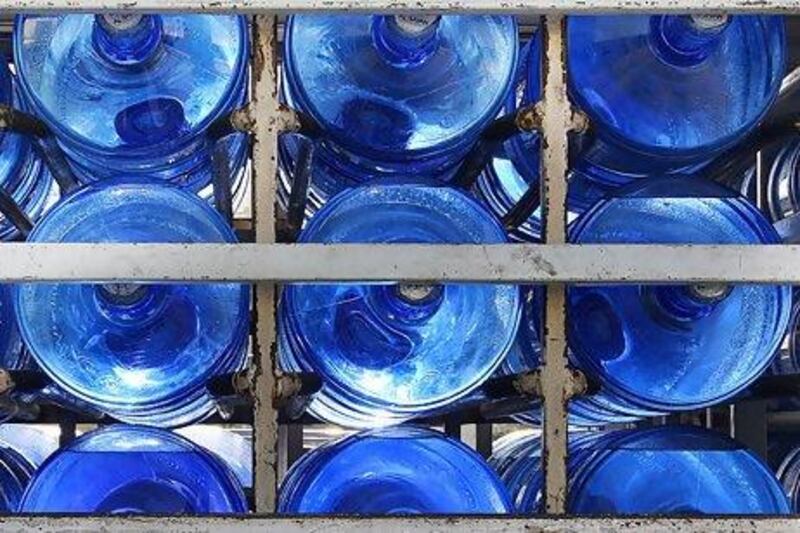With mean annual rainfall ranging between 46 and 119 millimetres, Abu Dhabi is among the driest places in the world, making water management essential for both environmental balance and economic prosperity.
Like the rest of the UAE and its Arabian Gulf neighbours, Abu Dhabi relies on desalination for most of its water. In the decades since the discovery of oil, the country's strategy focused on boosting desalination capacity to keep up with rising demand.
However, the high rate of population growth, coupled with recent awareness of the environmental impact of desalination, have lead decision-makers to review this approach, with the Government now evaluating demand as well as supply.
"A sustainable rate of water consumption, in the true sense, cannot be achieved in Abu Dhabi or the UAE as it never rains in any reliable or substantial quantity," said Matthew Griffiths, director of waste strategy and reuse at the Regulation and Supervision Bureau (RSB) and a participant in this week's World Future Energy Summit and International Water Summit.
"However, it may be possible to achieve efficient and effective water consumption levels.
"Balancing water supply and demand as efficiently as possible is becoming increasingly important and the construction of new desalination plants must be assessed in terms of legitimate increases in demand due to the expansion of the emirate."
On average, the per capita water consumption rate in Abu Dhabi is around 550 litres per person per day. However, according to Mr Griffiths, the figure should be "viewed in the proper context and compared with similar sets of consumption data from other arid, rapidly developing hot countries".
The Emirate is very hot and very arid, oil and non-oil industrial sectors are expanding, tourism and leisure facilities are rapidly increasing and Abu Dhabi has for many decades chosen to enhance significant common areas of its cities by means of irrigated green swards with various species of indigenous trees and shrubs for the benefit of its residents and visitors.
Recent analysis by the Bureau suggests domestic consumption of water in the metropolitan areas of Abu Dhabi and Al Ain represents only half of all the potable water consumed in the emirate. The rest goes to forestry and agriculture.
"A more realistic value for an average per capita consumption figure is likely to be much nearer 300 litres per day and perhaps lower - certainly for apartments where values are near the 200 litres per person per day," Mr Griffiths said.
The Bureau has launched several initiatives to encourage more efficient use of water. Consumers current pay only part of the cost of producing potable water.
While prices have not been increased, the RSB has started issuing new utility bills, which clearly state the water and electricity subsidy paid by the Government for each household - intended to increase awareness about the value of water resources.
The Bureau is also involved in work to consider and implement best practices to ensure the beneficial reuse of recycled water for irrigation and other purposes.
Currently, about 60 per cent of the treated wastewater in the city of Abu Dhabi is reused. In the city of Al Ain, all of it is.
"The 60 per cent figure for Abu Dhabi city will increase to a near maximum over the next few years when infrastructure is completed to support the growing communities' demands around the City," said Mr Griffiths.
At Masdar too, efforts are being made to minimise water use. At Masdar City, currently taking shape on the outskirts of Abu Dhabi, a holistic strategy to address sustainable water management from master planning to the end user appliances has been applied.
"We started by implementing highly efficient infrastructure design and monitoring system to identify and mitigate leakages throughout the city," said Dr Sultan Al Jaber, Masdar's chief executive.
Landscaped areas use native and adaptive plants, and efficient irrigation system and the treatment and reuse of waste water generated on site.
"These tactics, along with others, have helped Masdar City achieve a 54 per cent reduction in potable water demand," said Dr Al Jaber. Masdar is now sharing its experience with Abu Dhabi Municipality.
Dr Rachael McDonnell, water policy and governance scientist at the Dubai-based International Centre for Biosaline Agriculture, says the above steps are examples of how sustainable water management has become "an important part of the country's political agenda".
In Abi Dhabi, as well as the rest of the country, "there are a number of steps taken to ensure sustainable use of water resources," she said.





